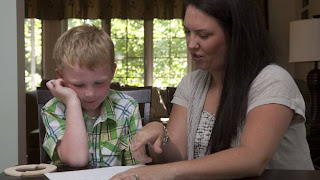August 13, 2012
Therapist Helps Kids Write Their Way to Success
(Halifax, Canada) After five years as a children’s occupational therapist at a Canadian hospital, Melissa Gibbons saw the handwriting on the wall.
The waiting list for kids struggling with basic penmanship skills was lengthy. Despite her own personal roster of nearly 100 clients, much of her time was absorbed by hospital bureaucracy.
“I felt I could be doing more work one-on-one with kids if I were outside the red tape of the hospital,” Gibbons said in an interview Thursday.
“The hospital is fantastic, but there are a lot of kids with needs, and there is only so much time in the day.”
Gibbons said kids with more serious disabilities were rightly prioritized above kids with handwriting concerns.
But she said kids with penmanship problems that don’t receive therapy early on can develop more serious learning issues.
“I decided launching my own business was a way to help these kids,” said Gibbons.
While private occupational therapists catering to adults such as injured workers or veterans were already established in Halifax, there was no one outside hospital walls helping kids with handwriting-related issues.
With a small business loan in hand, Gibbons launched Hands for Growth Occupational Therapy in the Halifax region in 2010.
Although she continued to work part time at a hospital for the first few months to minimize the risk of starting her own business, demand for Gibbons’s services soon grew.
She left the hospital, in part, to prevent a conflict of interest and continues to laud the work of professionals in the hospital setting.
But Gibbons, 31, said the flexibility of owning her own business allows her to focus her attention on her passion — helping children struggling with handwriting skills achieve scholastic success.
In a technological era when many kids play on computers before they can spell or print, complaints that handwriting has turned into mere scribbling seems outdated.
Yet Gibbons said illegible handwriting can lead to a lack of confidence, disinterest in school and eventually poor grades and behavioural problems.
While some of her clients have learning disabilities such as dyslexia, Gibbons said the majority have no diagnosed learning or developmental disorders.
“Every kid is different. The majority are really bright, great kids, but they have trouble writing. Sometimes their hand muscles are very weak and they suffer from hand fatigue, other times they are struggling with their motor skills or hand-eye co-ordination.”
Part of the issue lies in overworked teachers, large class sizes and a curriculum that doesn’t focus on handwriting, she said.
“Teachers are basically putting out fires. They don’t have time to focus on quality penmanship and in many elementary classes, cursive writing isn’t even taught.”
She recalls one mother who explained that her 15 year-old son couldn’t sign his name when opening up a bank account.
“Apparently the bank manager wasn’t sure what to do without a signature, but the boy had no idea how to sign his name.”
Gibbons said the wheels typically start to fall off for boys in Grade 3 — the lion’s share of her clients.
“Right smack in the middle of elementary school, teachers begin to expect more independence, and they’re not spoon feeding students the work anymore. Kids who have trouble with handwriting start to avoid it, and that affects their class work.”
Unless they receive therapy, Gibbons said students are sometimes put on individual program plans based on their strengths and needs. However, she said it can be difficult for students to return to the standard curriculum.
Gibbons said now that she has her own company she can adjust her schedule to meet the needs of each student and their family.
She said most of her appointments are 45 minutes and take place at the student’s school during regular hours.
Gibbons also tries to keep her schedule flexible, with some appointments during the evenings and weekends usually in a library setting.
She said part of making her business sustainable has meant lowering her overhead costs. Although she spends more on travel, using schools and libraries has allowed her to be flexible to meet the needs of clients while keeping her bills low.
“Like any small-business owner, I was worried about being able to pay my bills and make a real go of it. But it turns out being able to travel and adapt to the needs of clients has been a real bonus.”
Hands for Growth occupational therapy is covered by most private insurance plans and is accepting new clients, she said.
In additional to her occupational therapy degree from Dalhousie University, Gibbons said she has taken additional courses more directly related to children’s handwriting skills.
Although Gibbons said it was hard to track down clients when she first launched in 2010, she said she has benefited from word of mouth.
She has also reached out to pediatricians and psychologists who have sent many referrals her way, and she has also taken advantage of social media to promote her company.
(Source: thechronicleherald.ca)

No comments:
Post a Comment